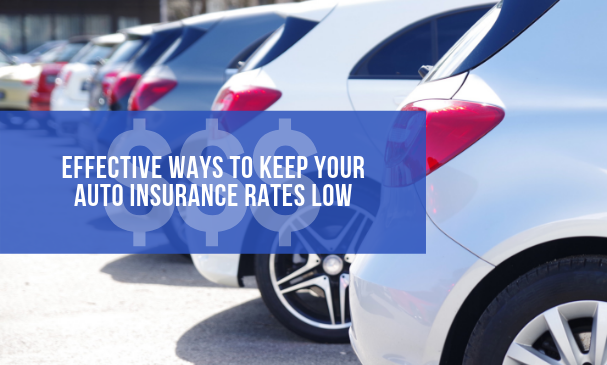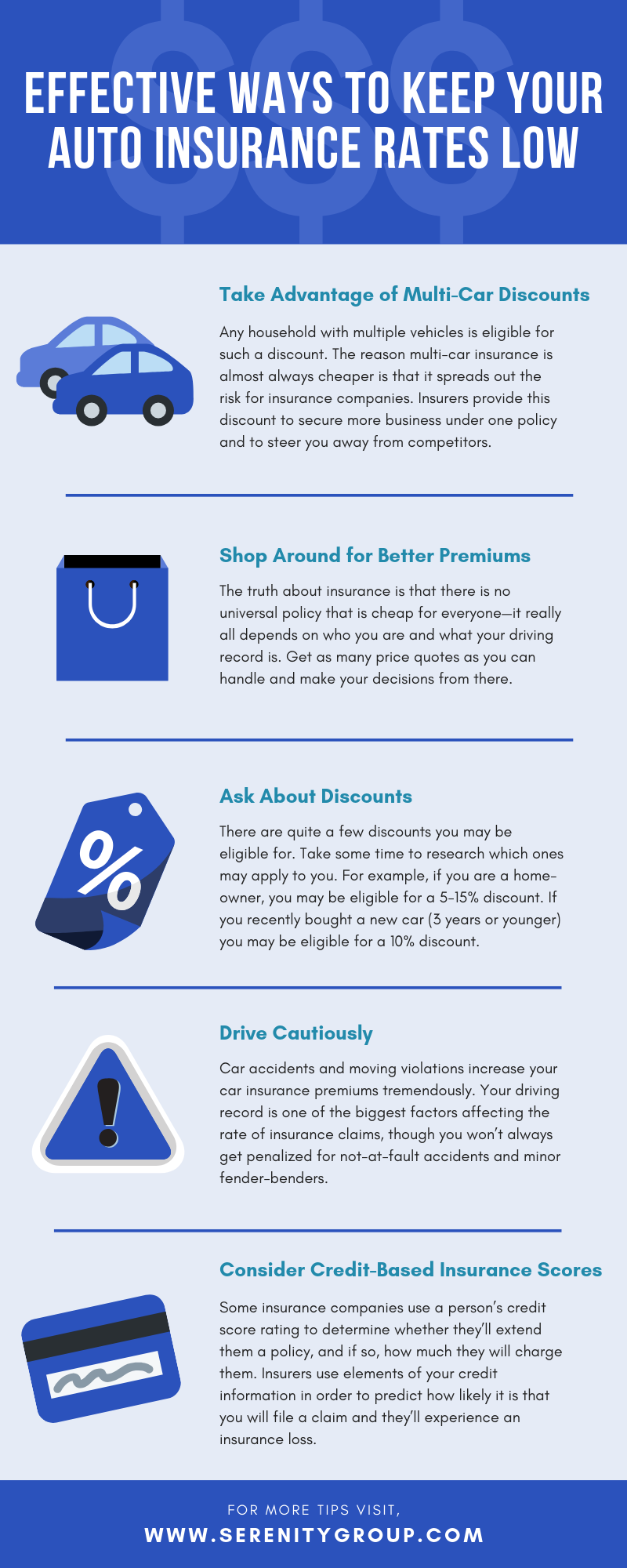Effective Ways to Keep Your Auto Insurance Rates Low

If you’re young and just starting to drive, the reality of responsible car ownership probably hasn’t set in yet. Car insurance isn’t fixed; rather, your car insurance responds to your level of competency as a driver. Over a period of time, skilled drivers can see their insurance costs lower significantly. Learn about the factors that can keep your auto insurance rates low and your wallet happy!
Take Advantage of Multi-Car Discounts
Any household with multiple vehicles is eligible for such a discount. Sometimes, you must register all vehicles under the same name, but this is not always the case. There are some exceptions to the multi-car insurance discounts—for example, you might not be able to bundle motorcycle insurance with car insurance.
The reason multi-car insurance is almost always cheaper is that it spreads out the risk for insurance companies. Insurers provide this discount to secure more business under one policy and to steer you away from competitors. It offers some nice personal benefits as well—having all your vehicles insured under the same policy means that you’ll have one payment and renewal date for your policy.
Each additional vehicle added on the policy adds to the discount; most insurance plans will cover up to five cars under one policy. Further, if a person on your policy were to file a claim, it will not affect your no-claims bonus.
Shop Around for Better Premiums
The truth about insurance is that there is no universal policy that is cheap for everyone—it really all depends on who you are and what your driving record is. Get as many price quotes as you can handle and make your decisions from there. Insurance companies often sell their insurance differently—some sell via their own agents, others sell through independent agents that offer policies from several companies.
Though Allstate, Geico, Progressive, and State Farm dominate most of the insurance market, don’t neglect local and regional insurance companies. People tend to be more satisfied with the service from smaller companies, and you might find it’s easier to negotiate on insurance with a mom and pop shop.
Ask About Discounts
There are quite a few discounts you may be eligible for. Here’s the rundown on just a few discount categories and the amount that might apply to you:
|
Type of Insurance |
Eligibility |
Average Discount |
|
Bundled |
Discount rates apply for unrelated policies with the same insurer as part of customer loyalty. |
5-10% |
|
Early Renewal |
For renewing before the policy expires. |
10% |
|
Multi-Car |
Insure more than one car on the same policy. |
10-25% |
|
Good Student |
Students under 25 with at least a 3.0 GPA. |
15-25% |
|
Senior |
Applies to drivers over 65. |
15-35% |
|
Low-income |
Mandated insurance for income-eligible drivers. |
N/A |
|
Home-owner |
Owns a home or condominium. |
5-15% |
|
Military |
Active military members and their families. |
15% for on base, 90% for deployed |
|
Accident-free |
Drivers with a history of no accidents that cost the insurer money. |
5% |
|
Low Mileage |
Drives 5k-15k miles/year. |
2% |
|
Defensive Driver Course |
Limited to approved courses only. |
10% |
|
Good driver |
NO at-fault accidents or moving violations for 3-5 years prior to purchasing insurance. |
15-25% |
|
Anti-theft |
Alarms, tracking systems and kill switches installed in your car. |
5-20% |
|
Hybrid/Electric |
Own or lease a hybrid car. |
10% |
|
New Car |
Car must be 3 years old or younger. |
10% |
|
Safety/restraint |
Applies to older vehicles with factory-installed airbags. |
5% |
|
Paid-in-full |
Pays full premium at the beginning of the contract. |
5-10% |
Drive Cautiously
Car accidents and moving violations increase your car insurance premiums tremendously. A 2017 study from Quadrant Information Services revealed that the average increase for a $2,000 insurance claim is about 44%. Your driving record is one of the biggest factors affecting the rate of insurance claims, though you won’t always get penalized for not-at-fault accidents and minor fender-benders. Your insurance will probably go up if the following statements are true for you:
- You’re at fault for the accident.
- There are thousands of dollars in damage.
- You’ve filed multiple claims with the same insurer.
- You’ve filed multiple claims with other insurers within a couple of years.
- Your state enforces no-fault auto insurance, in which your insurer pays for damages regardless of who is at fault.
Some states follow a point system in which moving violations accrue points on your license. Each incident assigns a different number of points on your record which insurance companies can access in order to alter your insurance policy accordingly. Every state has its own regulations for allocating points to your license, so check out your state’s rules before you drive. Minor traffic infractions, however, are generally not something to worry about when it comes to insurance premiums.
Across the United States, over 1 million people are arrested each year for driving under the influence. It may seem obvious to not drink and drive, but alcohol disrupts people’s decision-making ability and sometimes, they do the unthinkable. If an officer arrests you for drinking and driving, you’ll need to seek out insurance companies that offer SR22, a type of auto insurance specifically for drivers who have severe traffic violations.
Consider Credit-Based Insurance Scores
Some insurance companies use a person’s credit score rating to determine whether they’ll extend them a policy, and if so, how much they will charge them. Insurers use elements of your credit information in order to predict how likely it is that you will file a claim and they’ll experience an insurance loss. We know from FICO spokesman Jeff Scott that “Insurers use insurance scores along with other risk information, such as motor vehicle records (for auto insurance), loss history reports, property inspections (for property insurance), and application information to evaluate new and renewal auto and homeowner insurance policies.”
The good news is that typically, insurance companies cannot base your policy rates solely on your credit score information. In fact, some states outright prohibit it. However, if your state still allows credit-based insurance scores, you’ll want to take steps to improve your credit score. If you’ve improved your credit score significantly over time but haven’t seen that reflected in your insurance premiums, contact your insurers. It’s possible that they haven’t updated your credit score report analysis.


Recent Comments